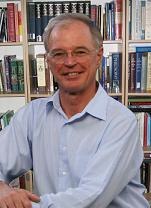Dr. Jeffrey I. Zink

Professor Zink has been a faculty member in the Department of Chemistry and Biochemistry since 1970. He received his B.S. degree in Chemistry at the University of Wisconsin. He came to UCLA after receiving his PhD degree from the University of Illinois under the direction of Russell S. Drago. He is a Distinguished Professor of Chemistry and a member of the California Nanosystems Institute. He has been an invited guest professor at the University of Paris VI and at the University of Amsterdam, and serves as an ACS tour speaker. He is an authority on triboluminescence, photochemistry and photophysics of metal-containing molecules, and on nanomachines, and has published almost 400 articles. His current research is focused on fundamental spectroscopic investigation of large metal-containing molecules and on design, operation and biological applications of functional nanomaterials including nanomachines such as valves and impellers.
Professor Zink and his research group work primarily in four different areas: excited state properties of large molecules; laser assisted chemical vapor deposition of nano-particles and structures; functional (optical and electrical) nano-structured materials; and nano-machines. Research on excited states is currently focused on coupled potential energy surfaces with special emphasis on photo-induced electron transfer. The research on deposition makes use of excited state properties to design molecules and direct bond-breaking to lead to desired products such as pure metals or semiconductors. Photolysis in confined spaces is used to produce nanoparticles. Studies of functional nano-materials are currently focused on energy transfer and electron transfer at the nanoscale. Active molecular components designed to produce the desired function are placed in spatially-separated regions in a onestep self-assembly process. Research on nano-machines is focused on rotating machines, oscillating "molecular impellers" and nano-valves. Unifying themes that run through all of these areas include theoretical understanding of molecular properties, materials synthesis and characterization, and spectroscopy (for measuring the excited state properties, monitoring photo-driven reactions, and observing the action of the molecular machines).
Both versatility and creativity are necessary so bring to fruition the highly interdisciplinary research comprised of diverse but interwoven parts. The research program on nano-machines is illustrative. Researchers must be able to design and synthesize entire systems such that moving parts can be attached to solid supports, energized by appropriate nano-power supplies and carry out useful work. The design of the moving components and the methods for powering the movement require fundamental theoretical understanding. Synthesizing these parts, the solid structure, and then the attachment requires experimental and synthetic skills. Measuring the action of the complete machine requires analytical skills. This research is carried out in a highly interactive environment and involves inter- and intra-departmental collaboration at UCLA, and international collaboration with colleagues in Europe and Asia. Undergraduate and graduate students and post-doctoral fellows receive a broad-based education in chemistry, materials science and nano-science.
Email: zink[at]chem.ucla.edu
Address: Mol Sci Bldg 2505A
Home Page:
http://www.chem.ucla.edu/dept/Faculty/zink.html/
Laboratory:
http://www.chem.ucla.edu/dept/Faculty/zink/index.html
Awards and Honors
-
-National Science Council of Taiwan, Visiting Lecturer
-
-SUNY Buffalo, Foster Chemistry Colloquium Lecturer
-
-US Department of Energy Material Sciences, Outstanding Scientific Accomplishment in Metals and Ceramics Sciences
-
-University of Amsterdam, Invited Visiting Professor
-
-University of Oklahoma, J. Clarence Karcher Lecturer
-
-University of Paris, Invited Visiting Professor
-
-Dow-Hansen Distinguished Teaching Award
-
-John Simon Guggenheim Fellow
Biography

Research Interests
Contact Information
Copyright (c) 2013
Zink Research Group